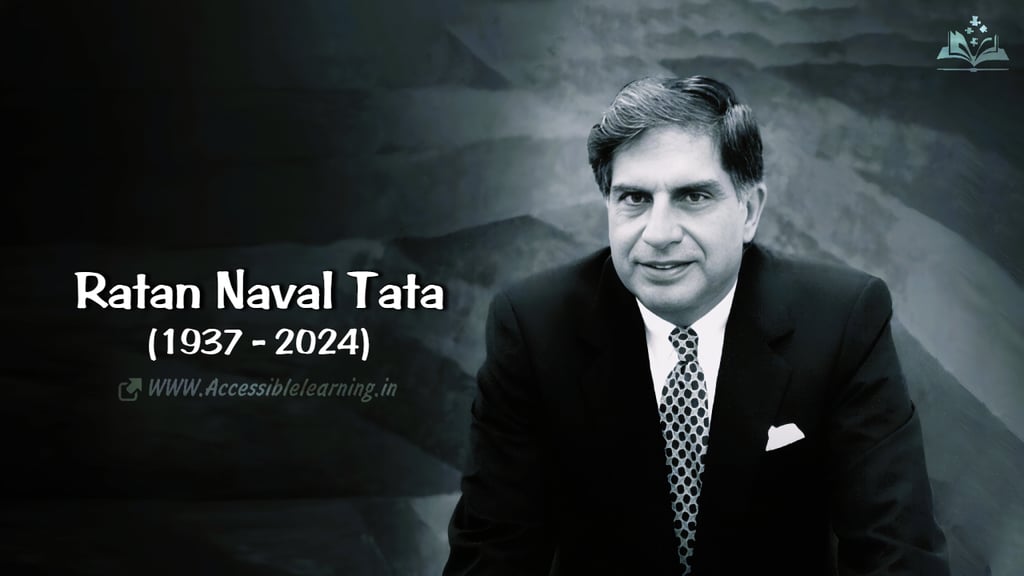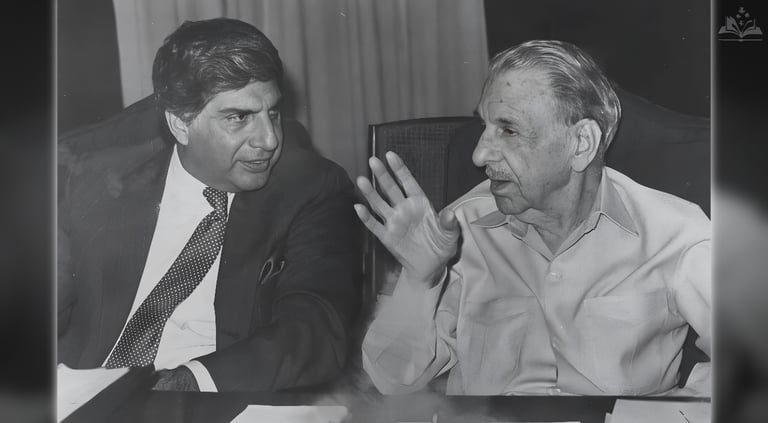
Ratan Naval Tata: The Architect of Modern Indian Industry
Ratan Naval Tata: The Visionary Industrialist Who Transformed India's Business Landscape Through Ethical Leadership, Global Vision, and Unwavering Commitment to Social Responsibility
WEALTHY FAMILYBIOGRAPHY/HISTORYCOMPANY/INDUSTRYENTREPRENEUR/BUSINESSMANBIOGRAPHY
Keshav Jha
3/20/20257 min read


Sir Ratan Naval Tata, the iconic Indian industrialist who led the transformation of the Tata Group from a conventional Indian conglomerate into a global powerhouse, left an indelible mark on business, philanthropy, and nation-building. His leadership philosophy, combining ethical business practices with ambitious growth, created a blueprint for sustainable corporate success that continues to inspire business leaders worldwide.
Early Life and Education
Born on December 28, 1937, into the prestigious Tata family in Mumbai, Ratan Tata's early life was shaped by strong values and educational excellence. The great-grandson of Sir Jamsetji Tata, the founder of the Tata Group, Sir Ratan was raised by his grandmother after his parents separated when he was young.
His educational journey took him from the Campion School in Mumbai to Cornell University in the United States, where he earned a degree in architecture in 1962. He later completed the Advanced Management Program at Harvard Business School in 1975, building a foundation that would inform his innovative approach to business leadership.
Professional Journey
Early Career
Ratan Tata's professional journey began on the shop floor of Tata Steel in 1962, where he worked alongside blue-collar employees. This experience gave him invaluable insights into the operational realities of manufacturing and fostered his deep respect for workers at all levels of the organization.
In 1971, he was appointed Director-in-Charge of the National Radio & Electronics Company (NELCO), a struggling Tata enterprise. Though his efforts to revitalize NELCO were hampered by economic and labor challenges, this experience prepared him for the leadership challenges ahead.
Ascension to Leadership
When Ratan Tata took over as Chairman of Tata Sons in 1991, the Tata Group was at a critical juncture. India had just begun its economic liberalization, and the group needed bold leadership to navigate the transition from a protected economy to a competitive global market.
Facing resistance from entrenched company heads who had operated with significant autonomy, Ratan implemented a strategic reorganization that consolidated the group's diverse businesses and established a unified vision. His leadership during this period demonstrated his ability to drive change while respecting the group's heritage.


Transformation of the Tata Group
Global Expansion
Under Ratan Tata's stewardship, the Tata Group embarked on an ambitious global expansion. The acquisition of Tetley Tea in 2000 marked the first major international acquisition by an Indian company. This was followed by landmark acquisitions including Corus Steel (2007), Jaguar Land Rover (2008), and numerous others across sectors.
These strategic moves transformed the Tata Group from a primarily domestic conglomerate into a global enterprise with operations in over 100 countries. The JLR acquisition, in particular, demonstrated Ratan's vision and courage, as it was completed during the global financial crisis when many questioned the wisdom of such a bold move.
Innovation and New Ventures
Ratan Tata's commitment to innovation led to groundbreaking initiatives across the group. Tata Consultancy Services (TCS) evolved into a global IT powerhouse, becoming one of the most valuable companies in India. Tata Motors developed the revolutionary Nano, conceptualized as the world's most affordable car, fulfilling Ratan's vision of making car ownership accessible to millions of Indians.
His forward-thinking approach extended to emerging sectors, with investments in e-commerce platforms, renewable energy, and aerospace ventures, positioning the group for future growth and relevance.
Leadership Philosophy
Ethical Business Practices
At the core of Ratan Tata's leadership philosophy was an unwavering commitment to ethical business practices. He famously stated, "I don't believe in taking the right decisions. I take decisions and then make them right." This approach was guided by the Tata Group's longstanding values of integrity, excellence, unity, responsibility, and pioneering spirit.
Under his leadership, the Tata Code of Conduct became a benchmark for corporate governance in India, emphasizing transparency, fairness, and social responsibility. This ethical foundation enhanced the group's reputation globally and created sustainable competitive advantages.
Employee-Centric Approach
Ratan Tata's leadership was characterized by a deep respect for employees. He championed initiatives for employee welfare, professional development, and inclusion. The group's approach to layoffs during economic downturns reflected his compassionate leadership; even when reductions were necessary, they were implemented with dignity and support for affected employees.
His accessibility to employees across hierarchical levels fostered a culture of open communication and mutual respect throughout the organization.
Philanthropy and Social Impact
Tata Trusts
Perhaps Ratan Tata's most enduring legacy lies in his stewardship of the Tata Trusts, which own approximately 66% of Tata Sons. Under his guidance, these trusts directed their considerable resources toward addressing pressing societal challenges in education, healthcare, rural development, and natural resource management.
The unique ownership structure of the Tata Group, with philanthropic trusts as major shareholders, exemplifies his belief that business must serve a larger social purpose beyond profit generation.
Disaster Relief and Community Development
Ratan Tata's compassion was particularly evident during crises. The group's response to disasters, including the 2004 Indian Ocean tsunami, the 2008 Mumbai terror attacks, and numerous natural calamities, demonstrated his commitment to community support.
The restoration of the Taj Mahal Palace Hotel after the 2008 terror attacks symbolized his determination and resilience, qualities that inspired the nation during challenging times.
Personal Qualities and Lifestyle
Humility and Simplicity
Despite his immense influence and wealth, Ratan Tata maintained a lifestyle characterized by simplicity and humility. He lived in a modest apartment, drove himself to work in Indian-made cars, and remained unmarried, dedicating his life to his work and philanthropic endeavors.
His unpretentious demeanor and accessibility made him a beloved figure among employees and the public alike, earning him respect that transcended business achievements.
Passion for Aviation and Design
An accomplished pilot, Ratan Tata's love for aviation was well-known. He personally piloted F-16 fighter jets and various aircraft, demonstrating his adventurous spirit. His training in architecture informed his keen eye for design, evident in the aesthetics of various Tata products and buildings.
These personal interests reflected his multifaceted personality and influenced his approach to business innovation.


Later Years and Ongoing Influence
Retirement and Continued Engagement
Though Ratan Tata officially retired as Chairman of Tata Sons in 2012, handing over to Cyrus Mistry (a decision later reversed in a corporate dispute), he remained actively engaged with the business world as Chairman Emeritus of Tata Sons and chairman of the Tata Trusts.
In his later years, he emerged as a prominent angel investor, supporting innovative startups in India and fostering entrepreneurship in the country.
Digital Presence and Public Connection
Adapting to changing times, Ratan Tata established a significant presence on social media platforms, where he shared his perspectives on business, social issues, and personal passions. This digital engagement connected him with younger generations, extending his influence beyond traditional business circles.
His thoughtful posts about animal welfare, particularly his love for stray dogs, revealed the compassionate side of his personality that resonated deeply with the public.
Challenges and Controversies
Leadership Transition Challenges
The succession planning at Tata Group faced significant challenges when Cyrus Mistry was removed as chairman in 2016, just four years after taking over from Ratan Tata. This corporate dispute became one of India's most high-profile boardroom battles, ultimately leading to Ratan Tata temporarily returning as interim chairman.
The episode highlighted the complexities of leadership transition in family-influenced business groups and raised questions about corporate governance practices. The Supreme Court of India eventually ruled in favor of the Tata Group in 2021, bringing closure to the legal aspects of the dispute.
Criticism and Business Setbacks
Despite his revered status, Ratan Tata faced criticism for certain business decisions. The Nano car project, while innovative, did not achieve the commercial success envisioned, partly due to positioning challenges and changing consumer preferences. Some acquisitions, particularly Corus Steel, faced challenges during global economic downturns.
Critics also questioned whether the global expansion strategy stretched the group's resources too thin across diverse sectors. However, Ratan Tata's willingness to acknowledge mistakes and learn from setbacks demonstrated his authentic leadership style.
Final Years and Legacy
Health Challenges and Passing
In his later years, Ratan Tata faced health challenges with the same quiet dignity that characterized his professional life. He continued his philanthropic work and mentoring of young entrepreneurs despite these personal challenges.
His passing on October 9, 2023, at the age of 85, triggered an unprecedented outpouring of grief across India and the global business community. The Indian government honored him with a state funeral, reflecting his stature as a national icon.
Enduring Impact on Business Education
Ratan Tata's leadership approach has become a staple in business education curricula worldwide. Case studies examining his transformation of the Tata Group, his ethical leadership style, and his approach to balancing business objectives with social responsibility are taught at prestigious institutions globally.
His emphasis on values-based leadership offers a valuable counterpoint to purely profit-driven business models, influencing a new generation of business leaders to consider the broader societal impact of their decisions.
Legacy and Impact
Business Legacy
Ratan Tata's business legacy is multifaceted. He transformed the Tata Group from a collection of disparate companies into a cohesive global enterprise with a unified vision. The group's revenue grew from approximately $6 billion in 1991 to over $100 billion when he stepped down in 2012, marking one of the most remarkable corporate transformations in business history.
Beyond financial metrics, he established new standards for corporate governance, ethical leadership, and strategic vision that continue to influence business practices in India and globally.
National Impact
Ratan Tata's contributions to India extended beyond the business realm. His leadership coincided with India's economic liberalization, and he played a crucial role in shaping the country's industrial landscape during this transformative period.
By demonstrating that Indian companies could compete globally while maintaining their values, he helped boost national confidence and project a positive image of Indian business on the world stage.
Awards and Recognition
His contributions earned him numerous prestigious awards, including the Padma Vibhushan (2008) and Padma Bhushan (2000), two of India's highest civilian honors. International recognition included honorary doctorates from prestigious universities worldwide and the Commander of the Order of the British Empire (CBE).
These accolades acknowledged not just his business achievements but his broader contributions to society and ethical leadership.
Sir Ratan Naval Tata's journey represents the harmonious integration of business excellence, ethical leadership, and social responsibility. His vision transformed not just the Tata Group but influenced the trajectory of Indian industry during a critical period of economic transition.
As business leaders worldwide grapple with questions of purpose, sustainability, and social impact, Ratan Tata's legacy offers a compelling blueprint: that commercial success and ethical conduct are not contradictory but complementary paths to lasting significance.
In reflecting on his remarkable life and career, perhaps his own words best capture his philosophy: "If you want to walk fast, walk alone. But if you want to walk far, walk together." This collaborative spirit, combined with visionary leadership, defines the extraordinary legacy of Ratan Naval Tata.
Subscribe To Our Newsletter
All © Copyright reserved by Accessible-Learning Hub
| Terms & Conditions
Knowledge is power. Learn with Us. 📚


